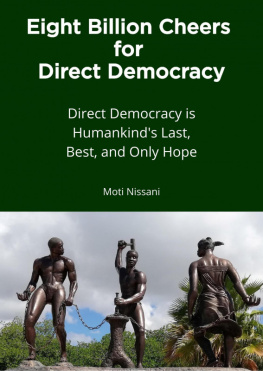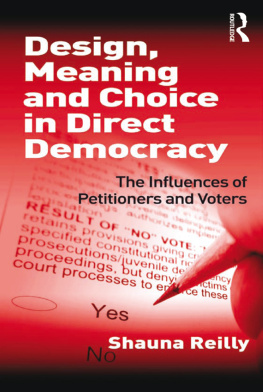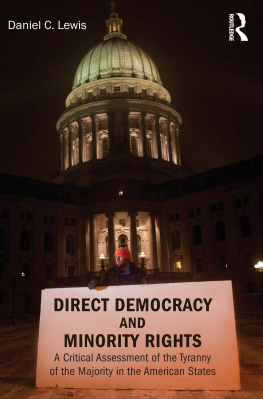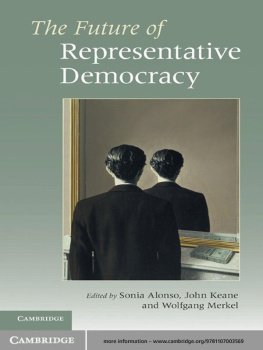Eight Billion Cheers for DirectDemocracy
Direct Democracy is Humankinds Last, Best,and Only Hope
Moti Nissani
ISBN: 979-8-2012389-0-2
Author: Moti Nissani
Title: Eight Billion Cheers for Direct Democracy:Direct Democracy is Humankinds Last, Best, and Only Hope / MotiNissani
First published: 2023.
Publisher: Dying of the Light Press
Copyright information: This is a public-domain bookthat can be downloaded at no cost. Every part of this book may befreely reproduced, stored in a retrieval system, or transmitted, inany form or by any means, without attribution or the prior consentof the author or publisher.
Includes bibliographical references.
Subjects: Direct DemocracyRealDemocracyOligarchyRepresentativeDemocracyDictatorshipSortitionReferendumAthenian Model ofDirect Democracy
StarvationHuman ExtinctionHuman ProspectState ofthe EnvironmentHungerNuclear WarNuclear PowerEnvironmentaltipping points
United statesUnited KingdomChina
PlatoThucydidesPlutarchRobert Michels
Cultural AnthropologyHunter-GatherersAncientAthensAncient ThebesAncient SpartaPersiaUnitedStatesSwitzerlandBerlin PhilharmonicMondragonCorporationIceland.
Cover photo: Nel Simons 1998 sculpture,Desenkaden (Unchained or Break the Chain),Curaao.
Inspiration for subtitle: Barber, Benjamin, R., 2003,Strong Democracy: Participatory Politics for a New Age.
Contents
About TheAuthor
Dr. Moti Nissani holds degrees in philosophy,psychology, and genetics. He taught at the InterdisciplinaryStudies Program and the Department of Biology, Wayne StateUniversity, for 20 years and served as a Fulbright Professor at theDepartment of English, Tribhuvan University, Nepal. He taughtuniversity-level courses in biology, astronomy, history, writing,critical thinking, and interdisciplinarity. He taught in China,served as a visiting professor in Cuba and Myanmar, and worked as apostdoctoral fellow at Flinders University, South Australia. He wasa recipient of the National Institute of Health postdoctoralfellowships at the Universities of Wisconsin and California. He isthe author of Lives in the Balance: The Cold War and AmericanPolitics, 1945-1992, and the Encyclopedia of DomesticAssassinations, a co-author of Flax Golden Tales, and acontributor to academic book collections. He published original,peer- reviewed, academic articles in such diverse fields aspolitics, history, history of science, environmental biology,climate disruptions, media studies, cognitive psychology, genetics,developmental biology, biofeedback, and interdisciplinarity. Since2008, he has posted dozens of articles in the alternative press,documenting the shortcomings and crimes of contemporary systems ofgovernance, highlighting humanitys gradual and needless slidetowards perpetual wars, greater wealth inequalities, neo-feudalism,and probable extinction; and showing that a far better world ispossible.
Preface
This book shows that direct democracy as opposed tosuch token democracies as India, the Russian Federation, or theUnited States provides the best hope for a free, just,prosperous, peaceful, and sustainable future. It defends the directdemocracy framework as it was once practiced by the Athenians andother Greeks, and as it is practiced today by some subnationalgroups. It specifically indicts such minority-ruled systems asrepresentative democracies, oligarchies, theocracies,president-for-life arrangements, and dictatorships.
Ancient Greeks almost certainly wrote many ingeniousdefenses of democracy, but their writings were destroyed by theravages of time and by the oligarchies and dictatorships thatfollowed the demise of Greek democracies. There are, however, manyextant defenses of direct democracy, thus raising the question: Whywrite another?
Three features of this book justify itsexistence.
or, at times, a combination oftheoretical and empirical arguments. Sadly, however, theoreticalarguments in the social sciences and humanities, althoughinstructive, are almost always inconclusive. Some writers believethat history will end with the dictatorship of the proletariat,while others glibly assure us that it has already ended withneo-liberal economics. Similarly, some writers argue for economicequality, others for the concentration of wealth in a few hands,while still others for the idea that the best way to improve theeconomic situation of the poor is to give more money to therich.
All such theorists mistakenly believe that they canreason their way to the truth. By contrast, for the most part, thisbook makes the case for direct democracy by relying on facts andempirical generalizations. And the one chapter that is partiallydevoted to theory does not set for itself the unachievable goal ofproving the superiority of direct democracy. Instead, it only showsthat direct democracy can be defended, at the very least, just aswell as dictatorships, oligarchies, representative democracies,and totalitarianism.
Interdisciplinarity. Most writers on directdemocracy are specialists, often anthropologists, politicalscientists, historians, or classical scholars. They thus frequentlyfail to incorporate crucially relevant cross-disciplinaryinsights.
It underscores the urgency ofreplacing current political systems with direct democracy. Itexplains why, paradoxically, most people are, at best, lukewarmabout the idea of governing themselves. It allows us to see that,far from being an oddity, direct democracy is the default conditionof human societies. By covering Athens and Switzerland at greatlength, it allows us to appreciate the achievements, intricacies,and potential of direct democracy. By comparing direct andrepresentative democracies, it allows us to see that we can dobetter than we are doing now, and that we can do so by combiningthe best features of both. By providing a few present-dayillustrations, it shows that direct democracy can accomplish justas much now as it did in the past. Finally, this approach providesuseful blueprints for the implementation of direct democracy in thecontemporary world.
This book documents all these incontestable truths,and a lot more. Pedagogically and psychologically, this mayalienate many readers. What then is the point of writing it? Tobegin with, it is possible that this book might help a few peoplesee the world differently and struggle intelligently to make itbetter. For the most part, however, this book is written for thesame reason that a child builds intricate sandcastles, knowing thatthey will be glimpsed by few and will soon be swept away by therising tide.
Walt Whitman is my guide:
Overview. Chapter 1 shows that humanity isunwisely, suicidally, scandalously, and heartlessly governed,thereby providing the rationale for the main theme of this book: Asearch for a free, sustainable, just, and peaceful system ofgovernance. Chapter 2 argues that the rulers of humankind havealways dreaded direct democracy, and hence resorted to propaganda,phony arguments, distortions, and oppression to make sure that realdemocracy never rises again. Chapter 3 shows that direct democracyprevailed everywhere throughout most of human existence, and hence,that liberty, equality, fraternity, stability, cooperation, andhappiness are the default, naturally-occurring, condition of humanbeings. Chapter 4 reconstructs the democratic governance of ancientAthens and its unparalleled achievements, then shows that theAthenians achieved so much precisely because they were free.Chapter 5 underscores again the marvel of Athenian democracy bycomparing it to the USA, leading to the conclusion that the idealpolitical system would merge the positive aspects of representativedemocracies with the Athenian political and judicial system.Chapter 6 argues that oligarchic Switzerland's remarkableachievements can be traced to decentralization and to the meagerdirect democracy component of its constitution. Chapter 7 exploresfive current exemplars of direct democracy, showing that directdemocracy could bear just as many delicious fruits in thecontemporary world as it did in hunter-gatherer bands and inancient Athens. Chapter 8 argues that direct democracy can bebetter defended on moral, factual, and theoretical grounds than anyother political system. Chapter 9 shows that we can comfortablyapply the tried-and-true positive features of Athenian democracy tothe contemporary world.








